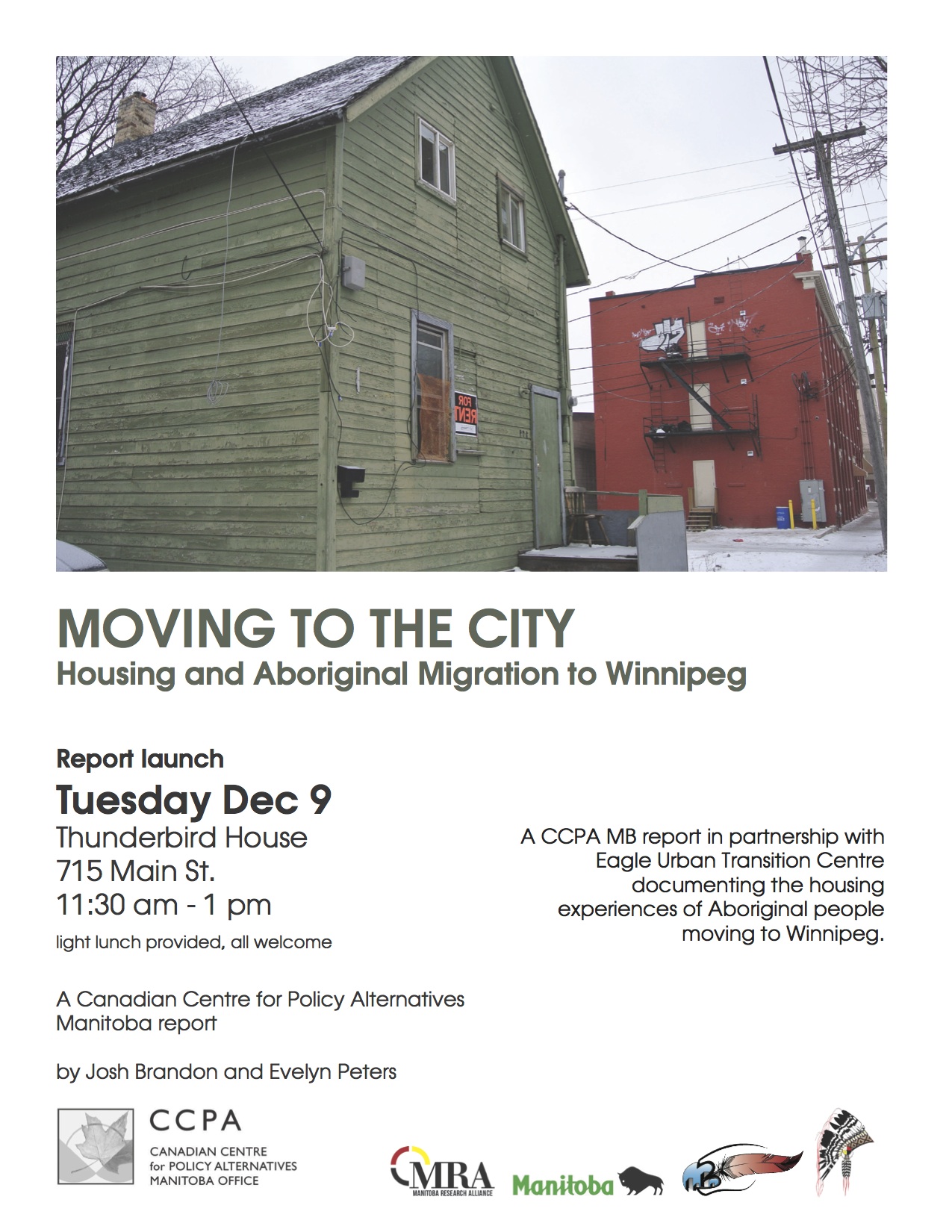Winnipeg is home to Canada’s largest Aboriginal population. Aboriginal people, however, are among the most likely to experience homelessness and are also over-represented in housing that is unaffordable, overcrowded or in poor condition. Finding housing has become a wall preventing many Aboriginal people from successfully making Winnipeg home. Moving to the City: Housing and Aboriginal Migration to Winnipeg documents the housing experiences of Aboriginal people moving to Winnipeg.
In conducting this research we worked closely with the Eagle Urban Transition Centre (EUTC), one of the only Aboriginal run service agencies of its type across Canada that help First Nations, Métis and Inuit people as they move to the city.
EUTC has helped thousands of Aboriginal people with finding housing, employment, accessing health care and other services. By bringing all these resources together in one centre, they help connect their members to programs in the community. Despite the tremendous work EUTC does already, our research found more resources are needed to ensure that all Aboriginal people in Winnipeg are securely housed.
Barriers to housing
Some Aboriginal people are pushed off reserve communities by poor housing conditions. Participants we interviewed spoke of long waiting lists for housing, overcrowding and lack of running water in their home communities. Overcrowding remains six times greater on reserve than off reserve. The shortfall of housing and poor housing conditions force many Aboriginal people to choose between bad housing in their home communities and insecure and unaffordable housing in cities like Winnipeg.
Aboriginal people also face considerable barriers to finding housing in Winnipeg, principally related to poverty.
- Aboriginal Manitobans have almost double the poverty rate as the general population: 17.2 percent compared to 9.7 per cent.
- Unemployment rates almost three times as high within the core working-age population.
- For three quarters of Aboriginal migrants to Winnipeg incomes remain below $10,000 per year 15 months after arriving in the city.
Market housing is expensive and subsidized public housing is of limited availability. As a result, many people coming to Winnipeg share with friends and family members. Commonly, this arrangement is referred to as “couch surfing” but should properly be seen as overcrowding and a form of hidden homelessness, with consequent social and health impacts.
The long-term effects of colonialism and institutionalization haunt many Aboriginal people. The effects of residential schools, the Sixties Scoop, intervention by Child and Family Services and vastly disproportional rates of incarceration continue to be felt. Many Aboriginal people are the survivors of multiple generations of involvement with these institutions. One young person we spoke with had already spent two terms in jail. A revolving door between foster care and detention centres, between jails and shelters, leaves many Aboriginal people without the skills or resources to obtain adequate housing.
People moving to an urban environment for the first time often do not know their rights and responsibilities as tenants. Many arrive with no rental history, no bank accounts and no government identification. Some tenants reported being coerced into signing leases before seeing their apartments, landlords not returning damage deposits or other forms of exploitation. EUTC helps inform tenants of their rights, helping to resolve disputes, and also educates members on their responsibilities as tenants.
Closing the gap
On the basis of this research, we made 16 recommendations in five key areas: Increasing access to social housing; intergovernmental co-operation; increasing settlement and transitional supports; decentralizing transitional services; and increasing financial resources available to migrants. These include:
- Work with the Aboriginal community to create housing to accommodate the multi-generational and fluid family structures of many Aboriginal households
- Increasing cooperation between levels of government so that Aboriginal migrants do not face loss of services during their transition period.
- Better and more secure funding for EUTC and improve access to transition centres in other cities.
- Increase financial opportunities through better training and jobs for Aboriginal Manitobans, and raising EIA rates to 75 per cent of median market rent.
Many of the challenges Aboriginal migrants face in obtaining housing in Winnipeg stem from a gap in services as they transition from federally funded programs on reserve communities to provincially funded programs off-reserve. Streamlining processes for obtaining identification, applying for EIA and other services could help get Aboriginal people new to Winnipeg on their feet faster. Meanwhile, more support for transition services like those provided by EUTC are needed, both within Winnipeg and in smaller urban centres to make the transition easier.
The divide between the Aboriginal and non-Aboriginal communities in Winnipeg is heightened by deep economic divisions. Nonetheless, the future of our communities is closely tied: Winnipeg can only succeed if the Aboriginal people of this city find success. Ensuring that equal access to housing is available for Aboriginal people should be a priority for all levels of government and all citizens in Winnipeg.
Josh Brandon is the housing researcher at the Canadian Centre for Policy Alternatives – Manitoba.



